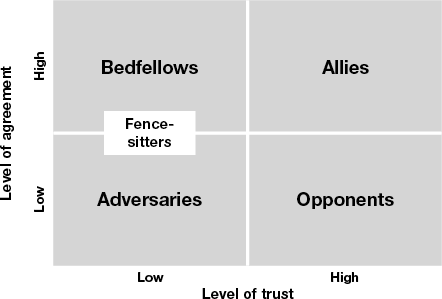Change Selection
01
Please choose a question

STAKEHOLDER ANALYSIS
Peter Block
Stakeholder analysis identifies those who have influence in a system. It provides
a framework to help understand the needs that they have and how to respond to
those needs.
Trust and Agreement
Stakeholder analysis categorises people according to the amount of agreement
they have for change and the amount of trust they have in the organisation to
make it happen.

Bedfellows: high agreement, low trust
They agree with the idea but don’t trust in the organisations way of doing things, but
they can be persuaded to see things differently. They tend to hear and say the things
that suit their own needs. They’re not entirely trustworthy. One minute they seem to be
supporting the idea and the next criticising it. While they can be generally kept on side,
they’re also keen backstabbers.
Adversaries: low agreement, low trust
These stakeholders don’t like what has been said and don’t have trust in the
organisation. They’ll typically resist all attempts at negotiation. Their oppositional
behaviour needs keeping to a minimum. So ask; what can be done to placate them?
Opponents: high trust, low agreement
They trust in the organisation but think the idea is a bad one. This means that they
question what has been done and said. This can lead to new ways of thinking as those
opposing ideas are explored. Because they trust the organisation already it is worth
trying to persuade them that the idea is a good one.
Allies: high trust, high support
These stakeholders are on side. They trust in the organisation and like where things are
headed. They are good friends and because of that a useful resource and good
collaborators to make plans with. They have influence over other stakeholders. Their
support needs maintaining but needs little input. It’s a mutually good relationship.
Fence sitters: low trust and really can’t decide if they like the plans or not.
Neither friend nor adversary they are worth negotiating with by asking; ‘exactly what is
it that’s stopping you’? But at the end of the day they usually make their own minds up.
Further Resources
This useful resource from the Office of Public Management helps to explain the
behaviours associated with each political skill, you can read it here.
